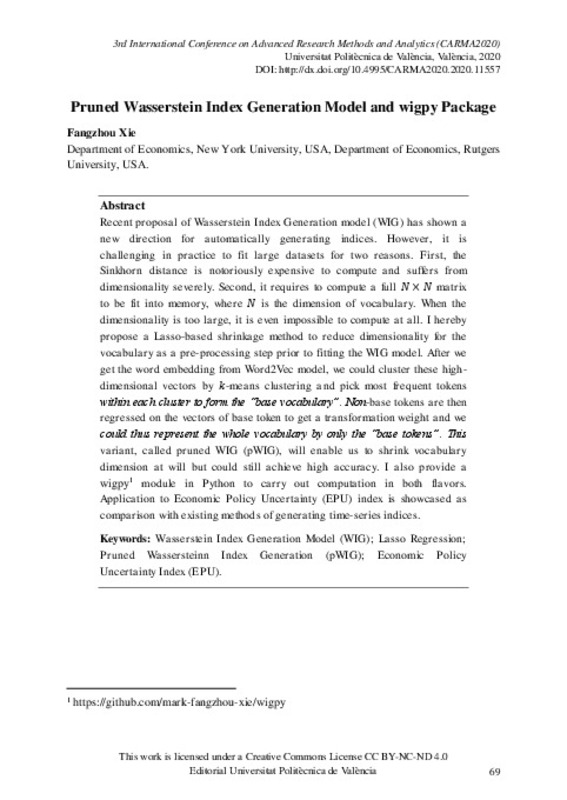JavaScript is disabled for your browser. Some features of this site may not work without it.
Buscar en RiuNet
Listar
Mi cuenta
Estadísticas
Ayuda RiuNet
Admin. UPV
Pruned Wasserstein Index Generation Model and wigpy Package
Mostrar el registro sencillo del ítem
Ficheros en el ítem
| dc.contributor.author | Xie, Fangzhou
|
es_ES |
| dc.date.accessioned | 2020-09-08T11:37:28Z | |
| dc.date.available | 2020-09-08T11:37:28Z | |
| dc.date.issued | 2020-05-08 | |
| dc.identifier.isbn | 9788490488324 | |
| dc.identifier.uri | http://hdl.handle.net/10251/149600 | |
| dc.description.abstract | [EN] Recent proposal of Wasserstein Index Generation model (WIG) has shown a new direction for automatically generating indices. However, it is challenging in practice to fit large datasets for two reasons. First, the Sinkhorn distance is notoriously expensive to compute and suffers from dimensionality severely. Second, it requires to compute a full N × N matrix to be fit into memory, where N is the dimension of vocabulary. When the dimensionality is too large, it is even impossible to compute at all. I hereby propose a Lasso-based shrinkage method to reduce dimensionality for the vocabulary as a pre-processing step prior to fittig the WIG model. After we get the word embedding from Word2Vec model, we could cluster these high-dimensional vectors by k-means clustering, and pick most frequent tokens within each cluster to form the “base vocabulary”. Non-base tokens are then regressed on the vectors of base token to get a transformation weight and we could thus represent the whole vocabulary by only the “base tokens”. This variant, called pruned WIG (pWIG), will enable us to shrink vocabulary dimension at will but could still achieve high accuracy. I also provide a wigpy module in Python to carry out computation in both flavor. Application to Economic Policy Uncertainty (EPU) index is showcased as comparison with existing methods of generating time-series sentiment indices. | es_ES |
| dc.language | Inglés | es_ES |
| dc.publisher | Editorial Universitat Politècnica de València | es_ES |
| dc.rights | Reconocimiento - No comercial - Sin obra derivada (by-nc-nd) | es_ES |
| dc.subject | Web data | es_ES |
| dc.subject | Internet data | es_ES |
| dc.subject | Big data | es_ES |
| dc.subject | Qca | es_ES |
| dc.subject | Pls | es_ES |
| dc.subject | Sem | es_ES |
| dc.subject | Conference | es_ES |
| dc.subject | Wasserstein Index Generation Model (WIG) | es_ES |
| dc.subject | Lasso Regression | es_ES |
| dc.subject | Pruned Wassersteinn Index Generation (pWIG) | es_ES |
| dc.subject | Economic Policy Uncertainty Index (EPU) | es_ES |
| dc.title | Pruned Wasserstein Index Generation Model and wigpy Package | es_ES |
| dc.type | Capítulo de libro | es_ES |
| dc.type | Comunicación en congreso | es_ES |
| dc.identifier.doi | 10.4995/CARMA2020.2020.11557 | |
| dc.rights.accessRights | Abierto | es_ES |
| dc.description.bibliographicCitation | Xie, F. (2020). Pruned Wasserstein Index Generation Model and wigpy Package. Editorial Universitat Politècnica de València. 69-76. https://doi.org/10.4995/CARMA2020.2020.11557 | es_ES |
| dc.description.accrualMethod | OCS | es_ES |
| dc.relation.conferencename | CARMA 2020 - 3rd International Conference on Advanced Research Methods and Analytics | es_ES |
| dc.relation.conferencedate | Julio 08-09,2020 | es_ES |
| dc.relation.conferenceplace | Valencia, Spain | es_ES |
| dc.relation.publisherversion | http://ocs.editorial.upv.es/index.php/CARMA/CARMA2020/paper/view/11557 | es_ES |
| dc.description.upvformatpinicio | 69 | es_ES |
| dc.description.upvformatpfin | 76 | es_ES |
| dc.type.version | info:eu-repo/semantics/publishedVersion | es_ES |
| dc.relation.pasarela | OCS\11557 | es_ES |








